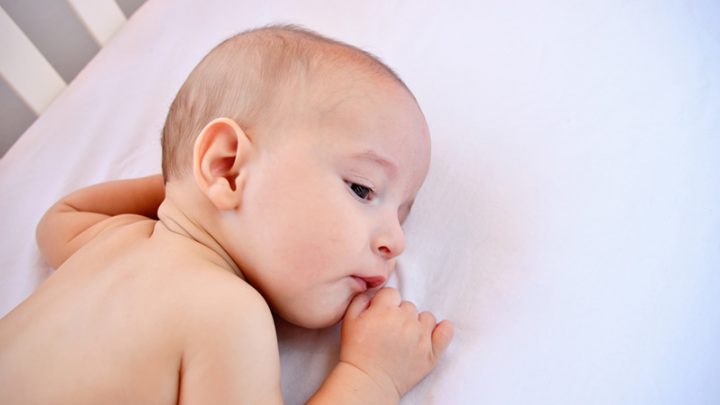One day, you noticed your sweet baby had started sucking her bottom lip. At first you found it adorable, but now you are a little worried. What started it? And could it have long-term health consequences?
If you see your baby sucking bottom lip, it’s most likely a self-soothing tactic, similar to thumb-sucking or sucking on a pacifier. It’s a temporary phase and the vast majority of babies grow out of it by their first birthday.
If your little one’s baby teeth are growing in, then she’s probably sucking on her lip to distract herself from the discomfort in her gums.
Sometimes this habit develops as a result of the baby realizing she can suck on her lip, which becomes a brief fascination until she moves on to the next thing.
Treatment isn’t always necessary, but if you are concerned that this habit has gone too far, you can offer your baby a pacifier and soothe the irritated area with some lip balm.
If, after all your best efforts, your baby still can’t seem to stop sucking her lips, then you should visit your pediatrician to see if there are any underlying causes of this issue.
Why Is Your Baby Sucking On Bottom Lip?
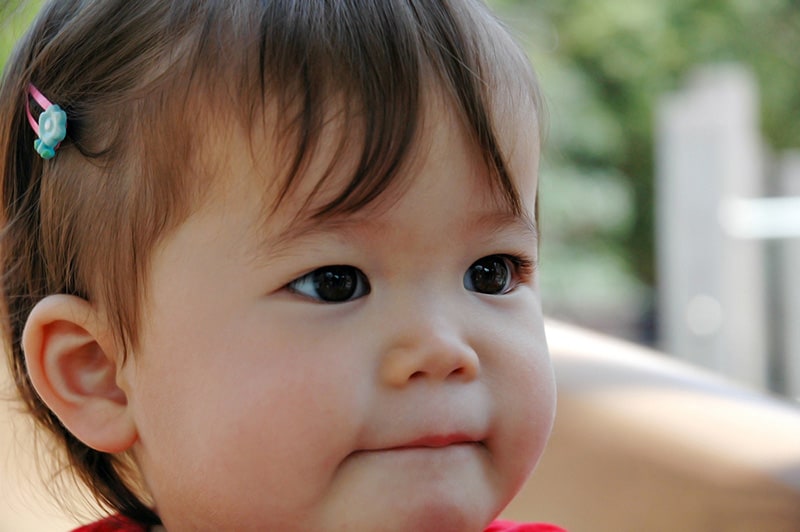
When you first notice your baby sucking bottom lip, you might be concerned or interested in understanding what it means. Is it normal?
Does this mean your baby is in distress? After all, your little one has no way of communicating with you other than through physical cues, so it’s important to understand what lip sucking means.
The good news is that your baby sucking on bottom lip is completely normal. Here are some of the most common causes.
Hunger
While an older child is perfectly able to let you know when they’re hungry (and will do so with gusto!), babies have to rely on non-verbal communication to get their point across. Older babies may point to food to let you know they are hungry, but younger ones give other signals.
For example, a hungry baby may start sucking her lower or upper lip and put her fingers in her mouth to indicate that she wants to eat.
Other hunger cues include:
• Moving her head from side to side.
• Moving her limbs.
• Making different sounds such as whimpering or cooing.
• If you’re breastfeeding, she’ll move her head in the direction of your breast when you’re holding her.
Crying is a sign of severe hunger in babies, and it’s important to feed your baby before she ever gets to that point. Even though your baby probably has a feeding schedule of her own, keep in mind that she might want to feed more during growth spurts, so it’s important to be flexible.
Teething
Teething is an important developmental milestone in the first year of your baby’s life. Most infants start teething when they’re around 6 months of age, which can be a challenging period for parents due to the baby’s fussiness and frequent crying.
Remedies include toys the baby can gnaw on, cold compresses, and chamomile tea.
When your baby sucks on her lip, it’s a kind of self-soothing tactic. Remember that babies find sucking to be comforting as it reminds them of breastfeeding, so this shouldn’t come as a surprise.
Teething is usually accompanied by many other symptoms, such as sore and red gums, excessive drool, and ear rubbing. You’ll also notice your baby wants to chew on everything in sight to relieve the discomfort in her gums.
By the time your little one is 2 to 3 years of age, her baby teeth will have completely grown in. Until then, all you can do is keep wiping her chin while she’s drooling, offer her toys to chew on, and try to relieve her pain with infant-safe remedies.
RELATED: What Helps For Teething Babies? 7 Best Baby Teething Remedies
Self-soothing
Although a baby sucking on her lower lip can be a way for her to cope with the discomfort of growing teeth, it’s equally as possible for it to be a way for your baby to soothe herself when she finds herself in a stressful situation.
It’s just as soothing as sucking on her thumb or a pacifier, so there’s no need to be worried that something is wrong. Your baby has just chosen her bottom lip instead of her thumb.
Baby wants to try solid foods
If you notice your baby sucking bottom lip while you’re eating grown-up food, it could be a sign that she wants to try some of the food from your plate.
Between 4 to 6 months of age, most babies are ready to start eating solid baby food , such as pureed vegetables, meat, and fruit, regardless of whether they’ve been formula-fed or breastfed.
Although you can buy ready-to-eat infant food at the store, I recommend using a baby food steamer and blender to make your own at home. This way, you can rest assured it doesn’t contain excessive amounts of sugar that could harm your baby’s health.
When introducing new food to your baby, it’s important not to have her try too many new things at once. In this case, if she has an allergic reaction for example, it will be more difficult to determine which food is to blame.
You can also give your baby common allergy-causing foods such as peanuts.
Severe misalignment
If your child has severe misalignment or an overbite, she might start (or resume) this habit when she’s a little older and has her front teeth.
As a result of the improperly positioned upper teeth, it’s very easy for your child to suck on the lower lip. This problem is most commonly fixed with braces, so be sure to pay a visit to your pediatric dentist as soon as possible.
A new stage of sensory development
From the moment they are born, babies start learning about the world that surrounds them, and as they begin exploring their environment and getting to know different people, they’re also discovering their own senses.
It’s quite possible that your baby has just recently figured out that she can suck on her lip, and is utterly fascinated by this new sensation.
However, the novelty will likely soon wear off and your baby will find something else to be entranced by, leaving her lips safe from excessive sucking.
That’s why it’s important not to panic when you notice your baby has developed this habit – be patient and wait to see if it will go away on its own.
Consequences Of Baby Sucking Bottom Lip
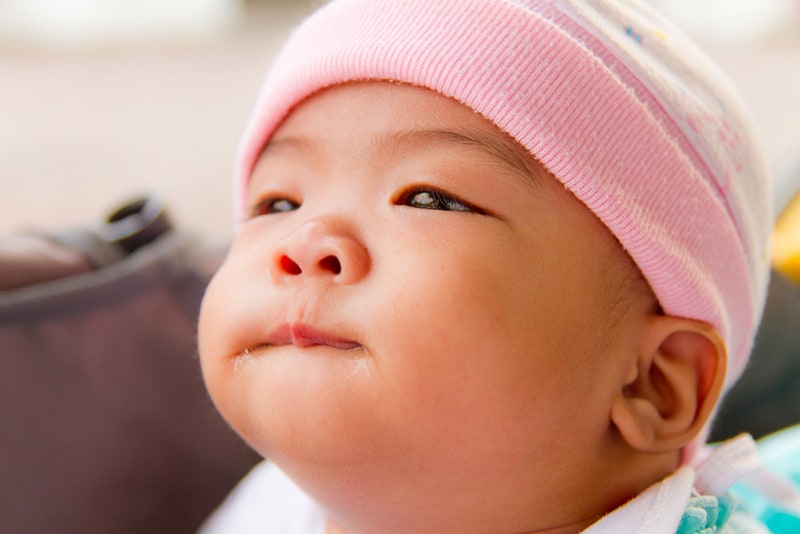
If your baby sucks on her upper or lower lip only sporadically, then it’s likely that there won’t be any consequences to worry about.
However, if this develops into a habit of sucking, then you might notice certain changes to your child’s mouth area.
Lip irritation
Excessive lip licking or sucking is a bad habit at any age, as exposing the sensitive skin of the lips to saliva can cause them to become irritated, red, or chapped.
Although saliva provides temporary relief for chapped lips, it also contains enzymes that make them even drier. If your baby’s lips appear to be irritated even though you haven’t seen her sucking on them, it’s possible that she does it when she wakes up in the middle of the night to soothe herself back to sleep.
Red ring around the mouth
Severe lip licking can also lead to the formation of a red ring around the mouth, better known as ‘lip licker’s dermatitis’. It’s very common among school-aged kids, especially in the winter months when the skin gets drier, and it’s caused by saliva damaging the skin around the lips.
Blisters
When your baby’s first teeth come in, there’s a risk of excessive sucking or lip biting causing the formation of blisters.
If they don’t heal properly because of constant exposure to saliva, you might want to talk to your pediatrician about possible treatments to prevent the area from getting infected.
Overbite
A baby that continues her lip sucking habit well into the toddler years (after she turns one year old) might experience serious consequences to her oral health.
When the lower lip is constantly being sucked into the mouth, the upper teeth and lip are pushed forward. Over time an overbite develops, and you will need to pay a visit to the dentist in order to correct it.
Speech issues
As well as the risk of developing an overbite, there is a chance that your baby might have speech issues. This can happen if her lip sucking habit becomes so extreme that she tries to speak with her lip in her mouth. She might not know how to correctly pronounce certain letters, making it necessary to begin speech therapy.
Treatment
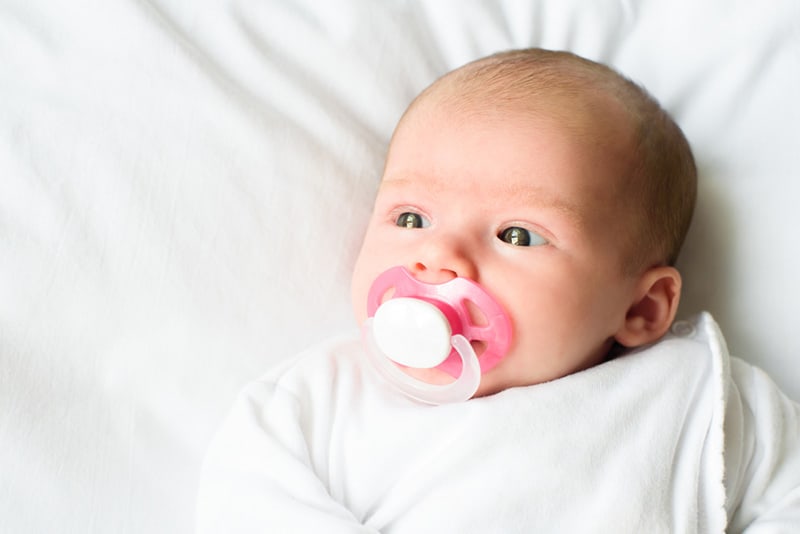
Considering that the majority of babies go through a lip sucking phase when they are teething or learning how to soothe themselves, you don’t have to worry about treating this habit right away, unless your baby’s lips are showing signs of irritation or she hasn’t kicked the habit after her first birthday.
The most important thing is not to yell or punish your baby for this habit – she’s far too young to understand.
Instead, try any of the following treatments.
Pacifier
You might have some reservations about pacifiers, especially if your baby is breastfed.
Some parents worry about having to fix nipple confusion , while others don’t want to go through the pacifier weaning process a few years down the line.
However, a pacifier can help by fulfilling your baby’s need to suck, while also preventing damage to her lips.
Alternatively, you can offer a teething toy for your baby to gnaw on if her habit of lip biting or sucking is a result of her teeth growing in.
RELATED:
Apply baby-safe lip balm
If your baby’s lips get chapped, treat them with baby-safe lip balm that will moisturize the skin and prevent it from getting even drier.
Find a distraction
Sometimes the habit of sucking becomes a way for the baby to entertain herself when she’s bored. If you suspect that this is the case, distract her with a fun toy or activity.
It could also be the case that she’s hungry and needs a snack. In this instance there’s no need to stick to a rigid meal schedule. You can always offer her some fruit if she has started solids.
Does My Baby Have Dermatophagia?
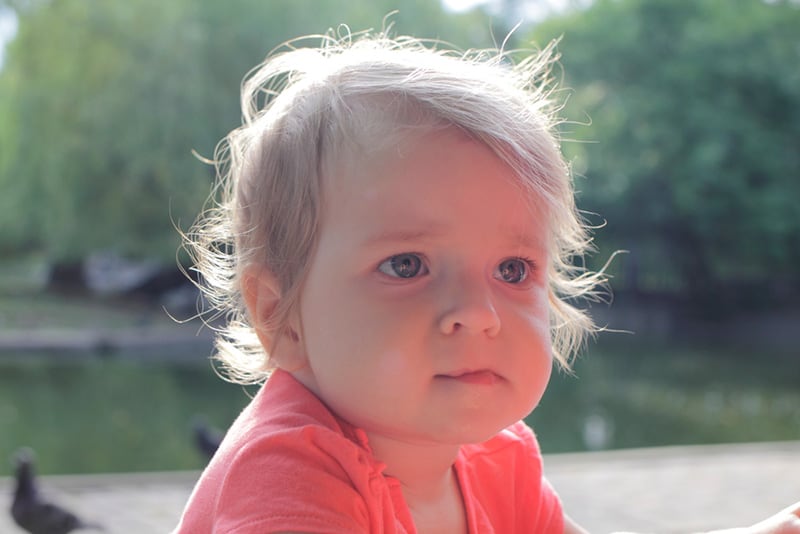
Even though it may cause some temporary discomfort, a baby sucking bottom lip is common behavior that usually goes away on its own during the first year.
Dermatophagia however, is very different from a baby simply biting or sucking on her lips. This is a psychological condition related to an obsessive-compulsive disorder, where a person compulsively bites or chews on their skin, usually at the fingers.
A baby is far too young to be diagnosed with this condition, so it’s not something you should be concerned about.
Other Important Baby Cues
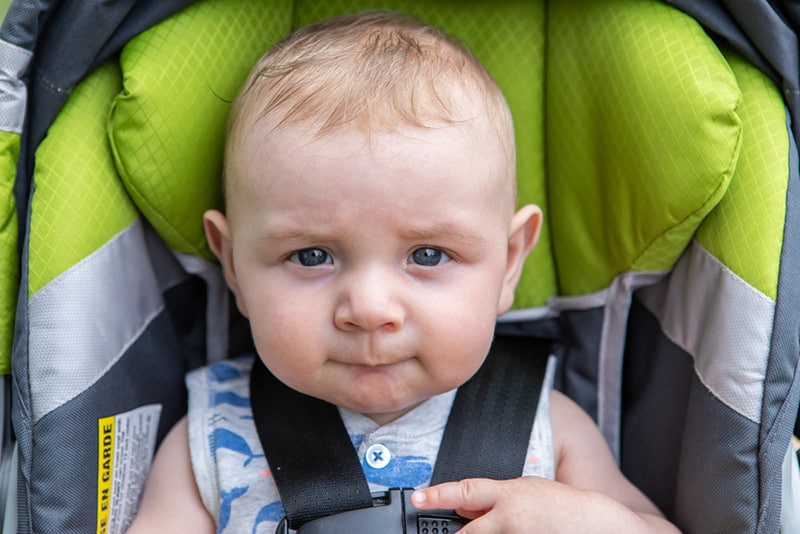
In addition to your baby sucking bottom lip, there are a number of other cues to watch out for that will tell you how your baby is feeling and what she wants.
Ready for playtime
Playtime is a huge part of a child’s development. When your baby is well rested and fed, she’ll let you know that she wants to play using the following cues:
• Reaching out to you.
• Smiling.
• Appearing alert and making eye contact.
Even though modern-day parents have access to lots of baby gear that will keep their little ones entertained, such as baby jumpers and activity centers, it’s important for your baby to be active during play and not just sit in one place.
By crawling around, sitting up, or cruising, your baby is developing important gross motor skills she’ll need for walking and running later on.
Ready to sleep
When your baby is tired, she’ll use the following cues to signal she needs you to put her down for a nap:
• She won’t be interested in playing with her toys or interacting with other people.
• She becomes fussy.
• Her eyes are staring off into the distance.
• Yawning.
• Thumb sucking.
Need to take a break
Babies can easily get overwhelmed by new experiences or being surrounded by too many people at once. If your baby gets overwhelmed, she might use these cues to tell you she needs to take a break:
• Looking away from the person she was interacting with or the object she was playing with.
• Turning her head in the opposite direction.
• Pressing her lips together or pouting.
• Yawning.
• Squirming and arching her back.
• Pressing her arms to the sides of her body.
When you notice these signs, it’s important to remove your child from the situation that was bothering her, otherwise she’ll get fussy and cry.
The Bottom Line
Before they learn to speak, babies use non-verbal communication to tell us what they need. There’s a wide range of cues that show they’re feeling hungry or tired, for example, and after some time you’ll become acquainted with your own baby’s cues.
If you notice your baby sucking bottom lip, you can rest easy knowing it’s just a developmental milestone that will eventually go away, much like your baby’s fascination with pulling on every necklace you wear!
Most of the time the root cause of this behavior is teething, or just a way for her to soothe herself when mom and dad aren’t around.
It might also mean that she’s getting ready to start eating solids, although your baby’s readiness depends on a variety of other developmental factors as well.
In any case, a baby sucking on her lower or upper lip is rarely a big issue that requires serious treatment. With time, your baby will grow out of this habit and you’ll forget you were ever concerned about it!
Like this post? Please share or pin it for later. You can also stay in the loop and follow us on Facebook, Instagram or Pinterest.
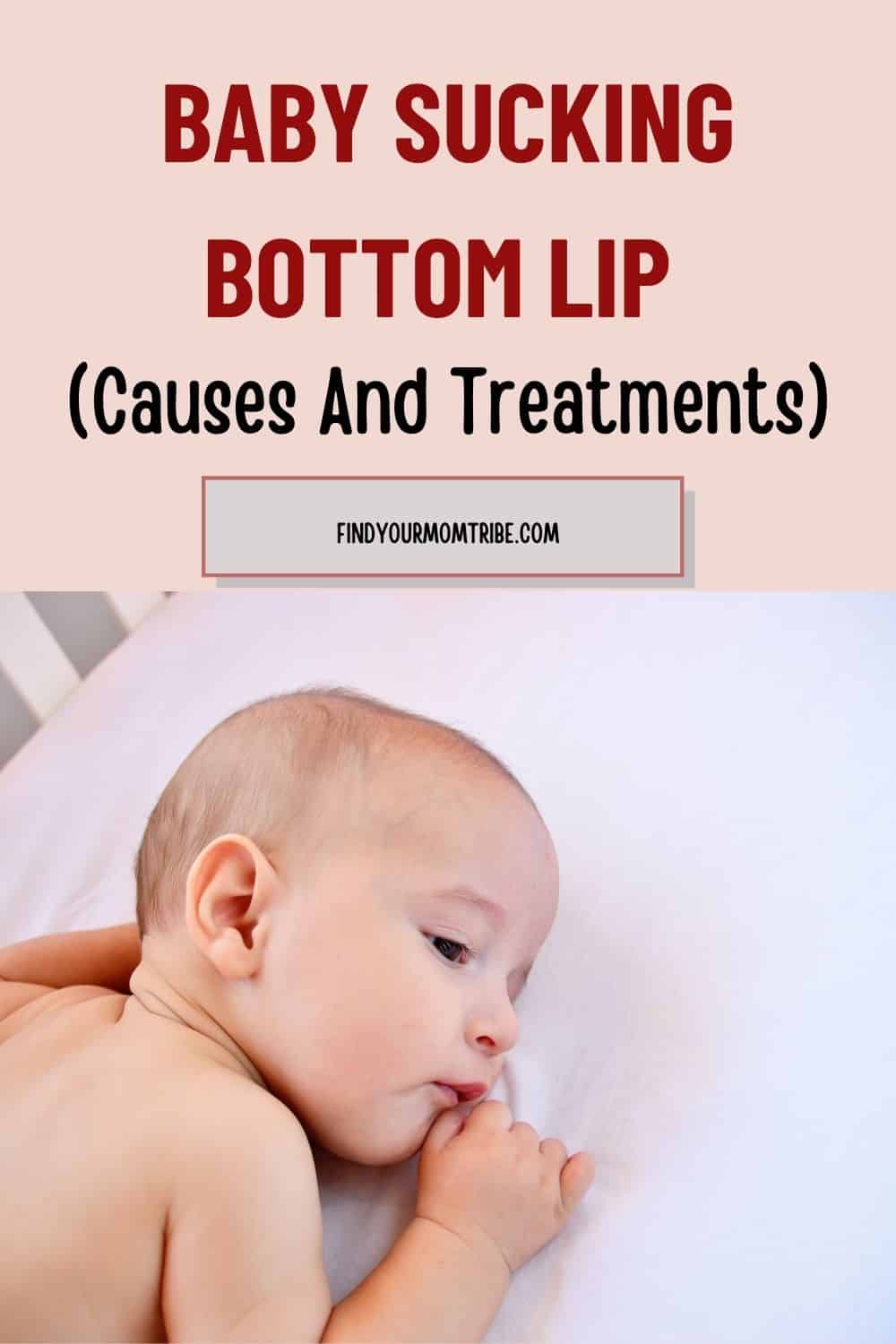
This post contains affiliate links. Please see our full disclosure for more info.

